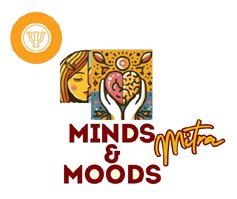Finding Calm in the Chaos: A Guide to Anger Management 😡
Anger management counselling is a specialized form of mental health counselling that provides individuals with the tools and strategies to understand, manage, and express their anger in a healthy and constructive way. A skilled psychotherapist or psychologist helps clients get to the root of their anger, identify their triggers, and develop effective coping mechanisms to prevent destructive outbursts. It’s a proactive step toward regaining emotional control and improving relationships.
A Trusted Professional in Nagpur: Rrimi Bodalkar
For those in Nagpur, Rrimi Bodalkar, a Sr. Psychotherapist / Mental Health Counsellor, is a highly qualified professional with expertise in anger management. With her M.A. in Psychology (Counselling) and PGDMH (Clinical), she has a strong foundation in a wide range of therapeutic practices. Her specialization in CBT, REBT & DBT (Specialised) makes her particularly adept at helping clients address the core thoughts and behaviors that drive their anger. As an NSDC Certified professional in Psychometric Analysis & Learning Style Assessment, she is well-equipped to provide a holistic and data-driven approach to your concerns.
Why is Anger Management Essential? Symptoms & Causes
Unmanaged anger can have a significant negative impact on a person’s life, from their relationships to their career. The symptoms that may indicate a need for anger management counselling include:
- Frequent Outbursts: Having frequent, intense, and uncontrollable fits of rage. This can negatively impact relationship counselling, marriage counselling, and parenting support counsellor efforts.
- Physical Symptoms: Experiencing a racing heart, sweating, and high blood pressure when angry.
- Aggressive Behavior: Acting out physically or verbally, such as yelling, hitting, or throwing objects.
- Chronic Irritability: A persistent feeling of being on edge, easily annoyed, or quick to snap at others. This can be a symptom of a deeper mood disorder or burnout.
- Negative Consequences: Losing a job due to workplace stress, having problems in couple therapy, or facing legal trouble due to an inability to control one’s temper.
The causes of unmanaged anger are complex and can be linked to a variety of factors. They may stem from a history of trauma, unresolved grief and loss, a high-stress environment, or ingrained negative thinking patterns. In some cases, anger can also be a symptom of an underlying condition like ADHD or a mood disorder.
The Counselling Procedure: A Path to Emotional Regulation
The procedure of treatment for anger management counselling is a structured and highly effective process.
- Initial Assessment: The therapist will work with you to understand your specific anger triggers, the frequency and intensity of your outbursts, and the consequences of your anger. This may involve a Personality assessment or other Psychometric Analysis to gain deeper insights.
- Identifying the Root Cause: The psychologist will help you understand that anger is often a secondary emotion that masks deeper feelings like hurt, fear, or sadness. This can involve exploring past experiences, such as a history of trauma therapy, to understand where the anger originated.
- Skill Building: A key component of anger management counselling is teaching clients practical skills to manage their emotions. These can include:
- Cognitive Restructuring: Using principles from Cognitive Behavioral Therapy (CBT) and Rational Emotive Behavior Therapy (REBT) to identify and challenge negative thinking and irrational beliefs that fuel anger.
- Mindfulness & Distress Tolerance: Using techniques from Dialectical Behavior Therapy (DBT) to learn to accept difficult emotions without reacting impulsively.
- Communication Skills: Learning to express feelings and needs assertively, rather than aggressively. This is a vital part of social skills training.
- Practice & Implementation: The therapist will guide you in practicing these new skills in real-world situations, helping you to find a constructive outlet for your anger and rebuild confidence building in your ability to manage your emotions.
Frequently Asked Questions (FAQ’s)
Q1: Is anger management a sign of a mental health disorder?
A: Unmanaged anger is not a disorder in itself, but it can be a symptom of an underlying mental health issue. A skilled psychologist can provide a proper diagnosis and an appropriate treatment plan.
Q2: Can anger management counselling help with workplace stress?
A: Yes. Many people experience anger due to workplace stress and burnout. Anger management counselling can help you develop better coping mechanisms and communication skills to navigate professional challenges without resorting to anger.
Q3: Can a child psychologist help with a child’s anger management?
A: Yes. A child psychologist is trained to help children manage their anger and can provide age-appropriate strategies for emotional regulation. This is an important part of providing support for special needs children.
Q4: Will I have to talk about my childhood?
A: While not always necessary, a therapist may explore your past to understand the origins of your anger. This can be a vital step in helping you to find a sense of peace and personal counselling.
Q5: What’s the link between anger management and relationship counselling?
A: Unmanaged anger is one of the leading causes of conflict in relationships. Anger management counselling can be a core component of relationship counselling or marriage counselling to help couples communicate without escalating to anger.

